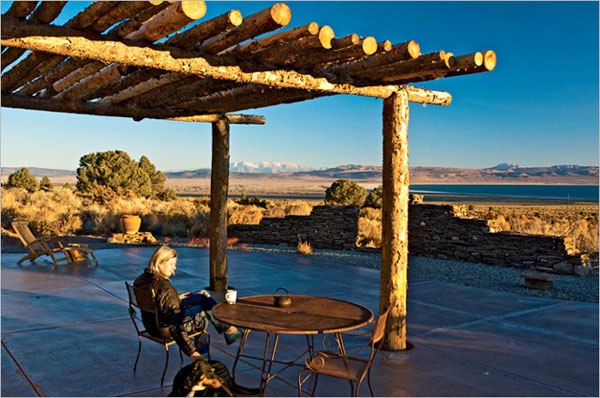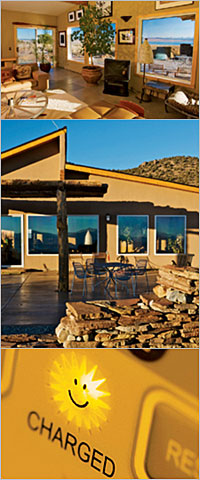sierraclub.org - sierra magazine - march/april 2009 - comfort zone


Comfort Zone | Smart Designs for Pleasure and Planet
The Accidental Eco-Tourist
By Ann Japenga

Homeowner Sarah Adams enjoys a timeless view of Mono Lake and the Sierra Nevada from her patio.
The silence. I didn't realize how much noise an on-the-grid house makes, with all its humming appliances.
Wash clothes, vacuum, and charge laptops at midday to take advantage of the strongest solar charge.
I came around to green living not out of conviction but as an Internet shopper looking for a vacation rental. When I found the little house with huge vistas of Mono Lake--a place owned by the granddaughter of photographer Ansel Adams, who famously captured the saltwater lake's austere beauty--the fact that it was off the grid meant no more to me than the classic Stickley furniture that adorned its interior. Both features seemed beside the point.
 The well-equipped interior hardly looks off the grid. A loose-stack rock wall adds rusticity to a home powered by solar panels. The solar inverter brings a smile to all who visit.
The well-equipped interior hardly looks off the grid. A loose-stack rock wall adds rusticity to a home powered by solar panels. The solar inverter brings a smile to all who visit.I drove up U.S. Highway 395 along the sheer backside of the Sierra Nevada, passed the Yosemite gateway burg of Lee Vining, and turned east toward Nevada. Civilization fell away, the dirt road dwindled, and there, amid pinon and sage, appeared an elegant one-bedroom lean-to with a discreet crop of solar panels.
The inverter gauge by the front door wore a smiley face when the solar voltage was strong, and at first I checked for that smile compulsively. After every shower, I'd hustle to flip the pump switch on the gravity-fed well. The house's green features seemed to call for constant vigilance.
My temporary abode was built by a late Sierra Nevada historian named Barbara Moore, who took on California's remote backcountry solo yet lived in fear of rattlesnakes--so much so that she moved a potbellied pig into her house. Pigs are said to ward off snakes.
Moore was no environmental zealot. She would have preferred to tap into power lines, but because that was impossible, she designed her house to take advantage of the sun and breezes, with high clerestory windows that let you adjust temperatures naturally and rough aggregate flooring that absorbs heat.
I eventually learned to stop obsessing about the power. I'd cram clothes into the high-efficiency washer, confident the well would pump and the solar would hold. Then I'd tote the wet clothes outside and exult in stringing them on the line with views of the Sierra and Mono's volcanic islands, Negit and Paoha.
My reverie was dampened by a fat snake track arcing under the clothesline. Soon I was hearing the cicada-like sizzle of rattlers everywhere--on the patio, by the stacked-rock wall, behind the daylilies. In the end, the snakes were no more trouble than the green living. Both were simply part of life here, like the Sierra air that parches your nose and dries your clothes instantly, with a bouquet of sage.
ON THE WEB What's your idea of a green living or work space? Tell us at sierraclub.org/sierra/shelter.
Photos by Justin Black; used with permission.